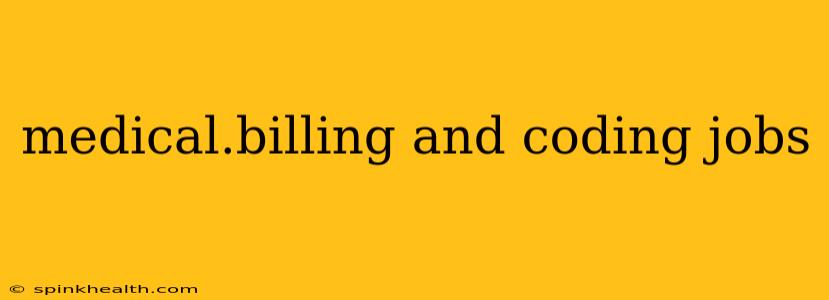The world of healthcare is vast and complex, a intricate tapestry woven with threads of science, compassion, and—yes—numbers. Behind every successful medical practice, hospital, or clinic lies a dedicated team ensuring the smooth flow of financial transactions: the medical billing and coding specialists. This isn't just about crunching numbers; it's about ensuring providers get paid fairly for their services, and patients receive clear, accurate bills. Let's delve into the fascinating world of medical billing and coding jobs, exploring the roles, responsibilities, and opportunities within this essential field.
What Does a Medical Biller Do?
Imagine yourself as the financial architect of a healthcare facility. That's essentially the role of a medical biller. They are the gatekeepers of revenue, responsible for submitting claims to insurance companies, following up on outstanding payments, and ensuring accurate and timely reimbursement. It's a job that demands precision, attention to detail, and a strong understanding of insurance regulations and billing procedures. Think of it as a complex puzzle where each piece (claim, payment, patient information) must fit perfectly to create a complete, accurate financial picture.
My own journey in medical billing began unexpectedly. I started as a receptionist, fascinated by the behind-the-scenes mechanics of how healthcare facilities managed their finances. The precision and problem-solving aspects drew me in, and I quickly learned that this wasn't just data entry; it was a critical function ensuring patient access to care.
What Does a Medical Coder Do?
If medical billing is the financial aspect, then medical coding is the linguistic one. Medical coders translate the detailed descriptions of patient diagnoses, procedures, and services provided by physicians into standardized alphanumeric codes. These codes, primarily using the Current Procedural Terminology (CPT) and International Classification of Diseases (ICD) systems, are the language insurance companies understand to process claims. It's a highly specialized role requiring a deep understanding of medical terminology, anatomy, and physiology. Accuracy is paramount, as even a minor error can lead to delays in payments or claim denials.
One particularly memorable experience involved deciphering a complex case involving multiple diagnoses and procedures. The initial coding was flagged by the insurance company, causing a delay in payment. Through meticulous research and cross-referencing of medical records, I was able to identify the error, correct the code, and secure timely reimbursement.
What are the Different Types of Medical Billing and Coding Jobs?
The field offers a range of opportunities, from entry-level positions to specialized roles requiring advanced certifications.
Entry-Level Positions: Often include roles like billing clerk or coding specialist, focusing on specific aspects of the process.
Mid-Level Positions: May involve supervising a team, specializing in a particular insurance type, or handling more complex claims.
Advanced Positions: Include roles like billing manager, coding supervisor, or compliance officer, requiring significant experience and often advanced certifications.
The beauty of this field lies in its versatility; you could specialize in a particular niche like dermatology billing or focus on a specific software system.
What Skills are Needed for Medical Billing and Coding Jobs?
Beyond technical skills like proficiency with medical coding software and billing systems, the successful medical billing and coding professional possesses a robust skillset:
- Attention to detail: Accuracy is paramount in this field.
- Analytical skills: The ability to analyze data, identify trends, and resolve discrepancies is crucial.
- Problem-solving skills: Billing and coding often present unexpected challenges, requiring creative problem-solving.
- Communication skills: Effective communication with physicians, patients, and insurance companies is essential.
- Organization skills: Managing large amounts of data and maintaining organized records is key.
What Education and Certifications are Required for Medical Billing and Coding Jobs?
While some entry-level positions may only require a high school diploma or equivalent, formal education and certifications significantly enhance your prospects. Associate's degrees in medical billing and coding are becoming increasingly common, as are various industry certifications such as the Certified Professional Coder (CPC) and Certified Billing and Coding Specialist (CBCS).
How Much Do Medical Billing and Coding Jobs Pay?
Salaries vary significantly depending on experience, location, and the specific role. Entry-level positions may offer lower salaries, while experienced professionals and those with specialized certifications can earn significantly more. The job market itself is generally strong, with consistent demand for skilled professionals.
What is the Job Outlook for Medical Billing and Coding?
The demand for medical billing and coding professionals is expected to remain strong in the foreseeable future. The aging population and the expanding healthcare industry will continue to drive this demand. Furthermore, the increasing complexity of insurance regulations and medical coding systems will necessitate highly skilled professionals.
Is Medical Billing and Coding a Good Career Choice?
If you enjoy working with numbers, have a keen eye for detail, and are interested in the healthcare industry, a career in medical billing and coding could be an excellent choice. It's a field that offers job security, opportunities for advancement, and a tangible sense of contribution to the effective functioning of the healthcare system.
This journey into the world of medical billing and coding reveals a field rich in challenges, opportunities, and a profound sense of purpose. It's a dynamic and evolving field, always adapting to the changing landscape of healthcare, offering a rewarding career for those with the skills, dedication, and passion to succeed.

